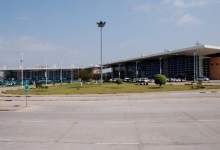

Since the recent Ebola outbreak in West Africa was first reported in March 2014, Roberts International Airport, the biggest hub in Liberia, has found itself the focus of intense international scrutiny.

Discover B2B Marketing That Performs
Combine business intelligence and editorial excellence to reach engaged professionals across 36 leading media platforms.
As authorities seek to stop the virus epidemic in its tracks, media images of screening checkpoints and boxes of medical equipment being unloaded from military planes have become commonplace.
Worse still, Roberts International, commonly abbreviated to RIA, has witnessed a number of airlines – including British Airways, Kenya Airlines and Nigerian operator Arik Air – suspend their services to the airport due to fears of contagion.
Some would argue, however, that RIA’s problems had started before the Ebola outbreak. In June, Air France pulled its bi-weekly service to Liberia, citing scant profit margins and concerns over the airport’s dilapidated runway. In 2012, an AF752 was reported to have sustained damage to its landing gear and brakes on account of a rough landing.
Two months later, in August, Delta Airlines cancelled its services from New York-JFK and Atlanta due to weak passenger demand and concerns over RIA’s creaking infrastructure.

US Tariffs are shifting - will you react or anticipate?
Don’t let policy changes catch you off guard. Stay proactive with real-time data and expert analysis.
By GlobalDataGame-changer: what effects could a new runway have on Liberia’s fortunes?
For a nation on the verge of economic disaster – the World Bank has predicted the possibility of a 12%-drop in Liberia’s economic growth at the hands of Ebola – the retraction of carriers from Liberian airspace is indicative of a grave underlying problem.
What does the future hold for the airport industry? We ask chief operations officer, Arjen Heeres, and business unit director, Marcel Dreef, at Quintiq for their thoughts.
After all, how can a country expect to foster trade relations – Liberia’s main agricultural export being rubber – if it is effectively quarantined? The purpose of today’s airport is as much financial as it is transitional, as exemplified closer to home by the current debate over expanding London’s airport’s capacity.
This makes the decision by the European Investment Bank (EIB), the long-term lending arm of the EU, to back the rehabilitation of Roberts International such a crucial step, in terms of Liberia’s economic recovery.
Announced in October, on the back of a series of World Bank IMF meetings in Washington, the EIB has pledged €19.6 million to upgrading RIA’s much maligned runway – as well as improving its drainage system – in order to meet civil aviation standards.
While the lending institution recently assured its support for the rebuilding of one of the country’s biggest hydropower plants, it marks the first time it has partnered with the Liberian Airports Authority.
"The European Investment Bank stands side by side with Liberia at this time of need," said EIB VP Pim van Ballekom at the signing of the agreement.
"We will continue our engagement with Liberian officials, partner institutions and European Union Delegations in the region and will ensure that any support we can provide will be of best use. Upgrading Monrovia’s airport is essential for Liberia and we are pleased to share experience from similar projects elsewhere in Africa."
Putting its money where its mouth is: other aviation projects funded by the EIB
Far from lip service, the EIB has demonstrated palpable support for improving airport infrastructure on an international scale, having invested €12.5 billion in upgrade projects over the last decade.
In 2012, it loaned €40 million to the African air traffic control agency ASECNA, due to the ongoing steep rise in air traffic over the continent. Through the improvement of navigation systems and security infrastructure, it is hoped the project – set to be fully implemented this year – will encourage more international flights and business activity across the region.
Another airport scheduled to benefit from EIB funding is Maputo International Airport, the main hub of Mozambique. Despite having emerged as one of Africa’s fastest growing economies in recent years – it is a leading exporter of coking and thermal coal, as well as liquefied natural gas – infrastructure projects in the South African nation still suffer from under-investment.
Poverty is also widespread across the country, with over 50% of Mozambicans surviving on less than $1 a day, according to recent reports.
Consequently, it is hoped that the EIB’s €20 million loan, ostensibly targeted at improving safety at Maputo in order to meet international civil aviation standards – work will include resurfacing the runway and improving landing lights and aircraft fuel supply infrastructure – will also create a raft of economic benefits.
Commercial drones on home turf represent a huge opportunity for business and a significant risk for air traffic control.
"Maputo is increasingly becoming a development pole, and this new investment plan is key to reinforce the safety and security standards of air travel," said Paul Malin, head of the delegation of the EU to Mozambique.
"It will continue to enhance the potential of regional and international cooperation and bring substantial benefits to the economy of the country. The investment in the Maputo airport complements the EU’s efforts to promote sustainable and inclusive growth in Mozambique.
"It is, in addition, an excellent example of complementarity between the EU’s and member states’ development cooperation in the country."
Humanitarian investment: runways and pathways to a better standard of living
Returning to Monrovia, Roberts International Airport, for the moment, remains synonymous as the gateway into the chain of devastation caused by Ebola; 3,556 people have died from the virus in Liberia, as of 12 January 2015.
The EIB’s decision to fund RIA’s new runway transcends mere aviation, and should instead be viewed upon as a long-term humanitarian investment, ultimately geared towards improving Liberia’s economic and social prospects.



